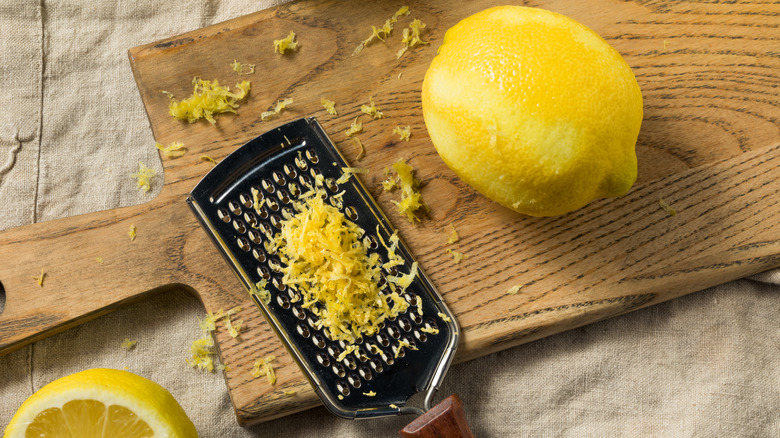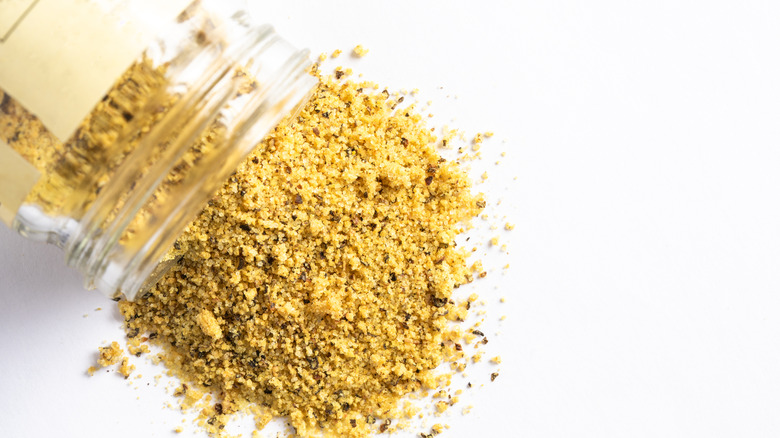How To Substitute Lemon Zest When You Just Don't Feel Like Grating
It happens to the best of us: Maybe you were planning to whip up some lemon pappardelle, but your brain short-circuited at the supermarket and you bought every ingredient except the lemon. Maybe you just don't feel like grating a dang lemon. This is a situation where having one of those plastic bottles of lemon juice in the fridge will help — at least there's a backup for the lemon juice, even if it's not fresh.
But the lemon zest part of a recipe is harder to work around: Nobody really keeps a backup stash of zest in their pantry or freezer. But there are substitutes you can use: Other fruit peels, seasoning blends, dried lemon peel, and juice are all possibilities, depending on what your needs are.
Generally, your best and first bet should be to scour your kitchen for other citrus fruits, particularly oranges or limes. You can grate the zest off these the same way, but naturally, the flavor will be a bit different. Lime is probably the best bet, as it's closer in sourness to lemon, but typically with a more powerful flavor, so you may want to use less. Orange zest is sweeter and less bitter than lemon, so while it may be a decent substitute in a sweet dish, tread carefully in savory dishes where orange isn't used super frequently as a flavor profile. If you don't want to zest anything at all, well, use juice or a seasoning blend.
Lemon juice versus lemon zest
It may seem more obvious to just reach for lemon juice in place of lemon zest, rather than gambling on other citrus fruits. This isn't a bad idea — but beware of the differences between the two. The zest contains citrus oils that add a distinctive lemon aroma and taste to a dish. In contrast, the juice is better for adding acidity and cutting through fatty notes — it won't add so much of a clear lemon flavor, especially if you don't add it at the very end.
Of course, if you're cooking something like a cake, where you need to be careful is the volume of liquid (so the end product holds together and isn't a sloppy mess). Typically, juice should be avoided. Go for a dry substitute like orange zest or freeze-dried lemon peel.
If neither lemon juice nor other citrus fruits are available, substitution gets trickier. Lemon extract (which will often come in a little bottle, similar to vanilla extract and other flavorings for baking) is a good idea — although plenty of kitchens won't have it — and if you have it, add it very sparingly due to its intensity. Dried lemon peel would also work, but will probably only be found in the most well-stocked kitchens.
Try anything lemony (or at least acidic)
If any of the previous substitutes for lemon zest are off the table, it's time to raid your pantry for anything with a hint of lemon in it. For example, you could try a lemon-infused olive oil, which could take the place of both the lemon zest and some (or all) of the fat in a recipe, sweet or savory.
Lemony seasonings are another possibility: So-called lemon pepper mixes (Mrs. Dash is just one brand that sells these) will often have dried lemon among their ingredients. But these mixes typically include various other ingredients from pepper to salt to garlic and dried herbs and spices, so this substitute is really only an option for savory dishes. Garlic in a lemon cake? No, thank you.
Lastly, white wine and other acidic liquids like white vinegar may help, but probably only to a limited degree. Their flavor and acidic nature means that they're better replacements for lemon juice, rather than lemon zest, as they won't have that lemony flavor (if fruity vinegars are an option, they're probably the better choice). Of course, these will only work for savory dishes.



